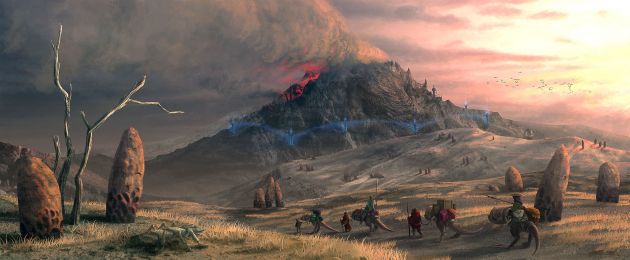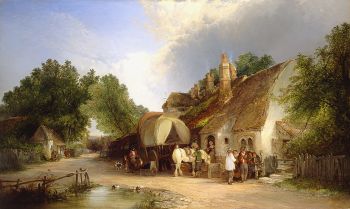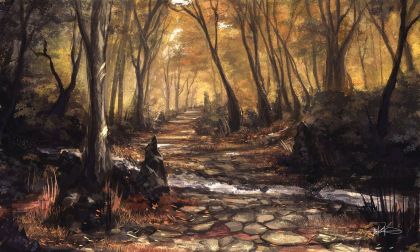Difference between revisions of "Travel"
Tao alexis (talk | contribs) |
Tao alexis (talk | contribs) |
||
| Line 25: | Line 25: | ||
After eating, the characters will return to their room to pack up. One or more persons must visit the stable to collect the party's animals, at a maximum of two animals per person. These animals will be watered, fed and brushed when collected. The stablemaster will sometimes point out any maladies in the animals that might have been noticed. If the party has a wagon, they will have stayed overnight in a roadhouse. Inns have no place to park a wagon. | After eating, the characters will return to their room to pack up. One or more persons must visit the stable to collect the party's animals, at a maximum of two animals per person. These animals will be watered, fed and brushed when collected. The stablemaster will sometimes point out any maladies in the animals that might have been noticed. If the party has a wagon, they will have stayed overnight in a roadhouse. Inns have no place to park a wagon. | ||
| + | [[File:Travel 01 - Leaving Home.jpg|left|350px|thumb]] | ||
The characters must settle up any costs with the premises, paying for any damage they've done; then they must drag their things out to the open street and load their animals there. Roadhouses that sit outside city or town walls have a yard, where the animals can be hitched up and things loaded. Inns have a stable but they do not have a yard, so this must be done publicly. | The characters must settle up any costs with the premises, paying for any damage they've done; then they must drag their things out to the open street and load their animals there. Roadhouses that sit outside city or town walls have a yard, where the animals can be hitched up and things loaded. Inns have a stable but they do not have a yard, so this must be done publicly. | ||
Revision as of 19:51, 27 April 2021
Much of the time, player characters will be troubled with the effort to go from one place to another, typically over distances that take many days. Travel creates problems that must be solved: gear must be taken along enabling sleep, prepared food and survival; mounts expedite travel but asks for skill in managing and feeding the animals; vehicles enable the transport of much material as well as opportunities for trade, but these too need care and maintenance. Water is sometimes an obstacle, so that ship travel must sometimes be tried. Weather is a constant hazard. This page makes some attempt to address many issues involved with journeying from place to place, but there are so many particulars to be discussed that for a time, the content below will need occasional updating — much of it during an actual campaign, when an unforseen issue requires an on-the-spot judgment.
Until such incarnations take place, then, this page should be treated as an outline, enabling details to be added in a constructive, organized manner.
Contents
Daybreak
Before a day's journey can start, the party will have to prepare themselves, their gear and their means of transportation. This might mean starting from a camp; or from an inn or other public house; or even from their own home. Certain tasks will apply to all three, while the conditions for the party at daybreak will also have peculiar characteristics worthy of detail.
Making & Breaking Camp
- Main Article: Making & Breaking Camp
All preparation for awaking and getting started in the outdoors begins with making camp the night before. The first concern is cooking. This must be done over a fire, which takes time to build. Wood needs to be gathered before it can be burnt. Failing to build a fire or eat hot food could mean illness from cold weather as well as parasites that are found in uncooked food.
Water needs to be gathered and animals tended. The characters will be busy with airing out their sweaty clothes, banging the dents out of their armour, sharpening their weapons, attending to repairs in equipment that wear and tear demands. Someone will need to take a walk around the camp to ensure the safety of the sight, to ensure the party hasn't settled near some large beastie's nest. Spellcasters will need time to study. Additionally, since my sage abilities are presumed to increase when a level is gained due to practice and meditation, this is also a part of settling down for the night.
Additionally, the characters will be tired. They are not machines. They will want to rest and enjoy themselves, tell stories, discuss events of the day and make plans for the morrow.
Come the next morning, these things have to be reversed. Gear must be gathered up, the fire kicked out, the tent taken down, the animals readied for travel and hitched to any vehicles the party may be using. The players must wash themselves, put on their dirty clothes, arrange their packs and insundries and stretch themselves for the journey ahead. There's a lot to do before starting off towards the next place.
Waking in a Public House
- Main Article: Lodging
Most inns or roadhouses will offer some food in the morning, usually porridge, stewed greens and hot tea or coffee. This has a charge of course. The characters will be awakened by a knock on the door that will come half-an-hour after daybreak; this is automatic and it does not matter if the characters are leaving that day or staying over. Characters who don't want breakfast may roll over and return to sleep, but they won't be allowed to make their own hot food on the premises, so if they miss this first meal they will need to seek food somewhere outside the lodging (food won't be served again until evening).
After eating, the characters will return to their room to pack up. One or more persons must visit the stable to collect the party's animals, at a maximum of two animals per person. These animals will be watered, fed and brushed when collected. The stablemaster will sometimes point out any maladies in the animals that might have been noticed. If the party has a wagon, they will have stayed overnight in a roadhouse. Inns have no place to park a wagon.
The characters must settle up any costs with the premises, paying for any damage they've done; then they must drag their things out to the open street and load their animals there. Roadhouses that sit outside city or town walls have a yard, where the animals can be hitched up and things loaded. Inns have a stable but they do not have a yard, so this must be done publicly.
Once loaded, the players must spend a little time reaching the road for travel. This can be a few yards for a roadhouse, but can require a half-hour of tortured streets when getting out of a large city.
Leaving Home
This simplifies some things; the players can sleep in, make their own breakfast and there's plenty of room for hitching the animals. However, it will be necessary to build a fire to make coffee and breakfast, and the animals will have to be watered and readied for the day's travel.
A solution, whatever the situation, is to engage servants to do some of the work. At home, a servant can have the animals ready to go before the player characters awake; their breakfast can be made ready for them, their clothes brushed and laid out, most of the necessary goods already loaded, the axle wheels greased and so on. Some of this work can be done around a camp, with servants to collect wood and water, tend the animals and get the fire started in the morning. At an inn or lodge, personal servants are less useful, as they won't be given access to the inn's kitchen, but they can still fetch the animals and harness them.
On the Road
To get out of a town or city, the party can rely on signs attached to houses or posts that will point the right way, so they may find themselves on the right road. The type of road that's found depends on the local population density and infrastructure, with intrinsic details on these matters being covered on the links given. Routes will be made of paving stone, cobbles, pounded dirt-clay or no better than grass and natural surfaces. Progressively less accessible roads will be recognized by ruts for cartwheels, heavy vegetation and the narrowness of passage.
Any intersection that includes at least one dirt road or better will have a road sign pointing the way to distant villages, towns and cities. There is little chance that these signs will go missing or lay broken at the side of the road, as there are locals who will check on their presence once per day. Every five or ten miles along cobbled and stone roads, depending on the region, there will typically be a marker telling the distance to the next down or from the last, posted on the left hand-side of the road.
Movement Pace
| Route | Movement per 10 hrs (miles per action point) | |||
|---|---|---|---|---|
| Ambling | Walking | Hurrying | Rushing | |
| High road | 5.2 | 7.8 | 9.4 | 9.8 |
| Low road | 4.7 | 7.1 | 8.5 | 8.9 |
| Cobbled road | 4.1 | 6.1 | 7.3 | 7.6 |
| Dirt road | 3.3 | 5.0 | 6.0 | 6.3 |
| Cart track | 2.6 | 3.9 | 4.7 | 4.9 |
| Cart path | 1.9 | 2.8 | 3.4 | 3.5 |
| Path | 1.3 | 1.9 | 2.3 | 2.4 |
| Trail | 0.8 | 1.2 | 1.4 | 1.5 |
| No route | 0.5 | 0.7 | 0.8 | 0.9 |


